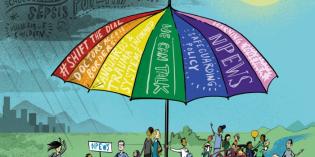The horror of events in the Syrian city of Aleppo – intensifying in late 2016 – demands a stronger international response than we have yet seen1 .
The RCPCH has a responsibility to speak out on behalf of vulnerable children, in the UK and globally2 .
The RCPCH condemns unequivocally the killing of children, whether directly targeted or otherwise, in situations of armed conflict. Killing or wounding of children in situations of conflict is prima facie evidence of breach of international humanitarian law.
- RCPCH urges all parties to conflict to exercise – with public scrutiny – every possible restraint to minimise exposure of children to violence in situations of conflict.
- RCPCH urges all parties to conflict, including the United Kingdom, to ensure adequate monitoring to gather evidence of civilian harm in situations of conflict, including harm to children3 .
RCPCH condemns any and all parties to conflict who attack, or fail to provide adequate protection to facilities whose primary function is to provide healthcare4 .
Healthcare facilities are protected under Security Council Resolution 2286; cases of attack on such facilities, whether accidental or deliberate, must be documented and investigated, and perpetrators – whoever they are – must be held to account.
- RCPCH urges all parties in situations of conflict to enable humanitarian access to civilian
- populations without qualification.
- RCPCH urges all parties to conflict, including the United Kingdom, to ensure – with public scrutiny – adequate planning and finance for post-conflict reconstruction, including health sector rebuilding and rehabilitation.
- RCPCH urges the United Kingdom to take a lead among donor countries in ensuring that children’s access to healthcare after cessation of conflict hostilities is resumed with the minimum of delay at least to pre-conflict standards, but preferably according to ‘build back better’ criteria5 .
RCPCH believes that children are children – wherever they happen to be in the world. Children displaced by conflict, or forced to flee beyond their home borders, carry with them all the rights enshrined in the Convention on the Rights of the Child6 .
A combination of international treaty commitments (to which the United Kingdom is signatory) means that ‘all children, regardless of their immigration status, have the right to protection, care and health services’7 .
RCPCH strongly advocates humanitarian provision of life-saving essentials through IDP and refugee camps and urges donor countries to ensure adequate provision of aid financing that supports them.
However, RCPCH urges EU and UK Governments to recognise and act on their responsibilities for refugee children – acutely unaccompanied minors – already present on the European mainland, and arriving in future. Nearly 90,000 unaccompanied child refugees arrived in the EU in the course of 20158 . These children are exposed to a wide range of extreme hazards from poverty and hunger to trafficking and sexual exploitation9 .
The UK has an absolute moral duty to lead within Europe and to demonstrate that leadership in practice.
- 1See e.g. www.nbcnews.com/storyline/aleppos-children; www.abc.net.au/news/2016-08-26/thirteen-syrianchildren-killed-after-omran's-video-appears/7789404; www.ibtimes.co.uk/lives-tragic-deaths-children-caughtsyrias-civil-war-graphic-images-1577017
- 2UN Security Council resolution 1612 (2005) identifies six grave violations against children during armed conflict: Killing or maiming of children; recruitment or use of children by armed forces and groups; sexual violence against children; abduction of children; attacks against schools or hospitals; denial of humanitarian access for children; see e.g. Save the Children (2013). Explosive weapons and grave violations against children: position paper, London; Save the Children (2011). Devastating Impact: explosive weapons and children, London
- 3See, e.g. AOAV (2012). Impact of explosive weapons by gender and age – Iraq 2003-2011: research paper, June 2012
- 4UNSC res 2286/2016 ‘strongly condemns attacks and threats against the wounded and sick, medical personnel and humanitarian personnel exclusively engaged in medical duties, their means of transport and equipment, as well as hospitals and other medical facilities’; see www.un.org/press/en/2016/sc12347.doc.htm ; see also ICRC (2015). Health Care in Danger: Violent Incidents Affecting the Delivery of Health Care, January 2012 to December 2014 (ref. 4237-ebook); healthcareindanger.org/resource-centre/
- 5See e.g. www.buildingbackbetter.org/#overview
- 6See e.g. www.unicef.org/crc/index_30177.html
- 7See, eg Williams B, Cassar C, Siggers & Taylor S. Medical and social issues of child refugees in Europe. Archives of Disease in Childhood, September 2016; see also, UN Declaration of Human Rights (1948), www.un.org/en/universal-declaration-human-rights/; Geneva Convention relating to the Status of Refugees (1951), www.unhcr.org/uk/1951-refugee-convention.html
- 8www.independent.co.uk/news/world/nearly-90000-unaccompanied-minors-sought-asylum-in-eu-in-2015-a7010976.html
- 9See e.g. www.worldvision.org/news-stories-videos/syria-war-refugee-crisis#sthash.hxZgpAhx.dpuf










